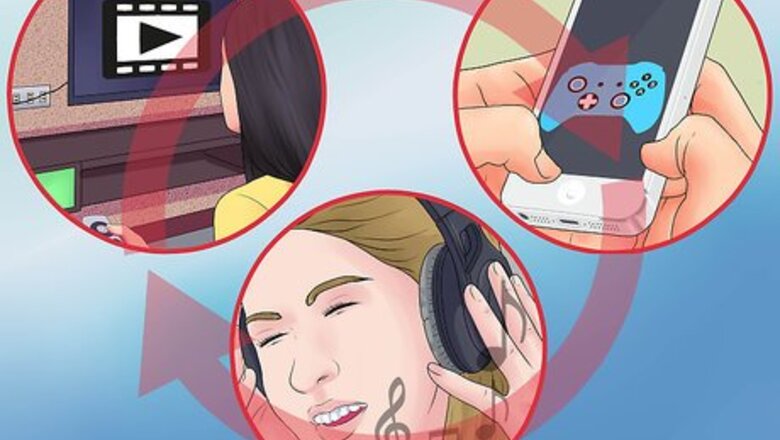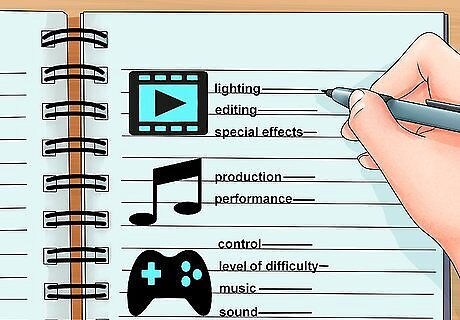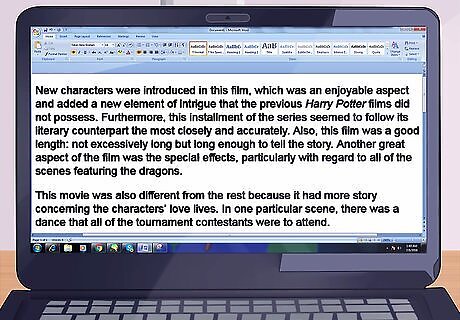
views
Researching the Game, Movie, or Music

Watch, play, or listen repeatedly. The first step in any review is to become as familiar as you can with the media product you are reviewing. Spend some time watching, listening, or playing. For movies, you should plan on watching the film at least 2 or 3 times. The first time, just watch and enjoy as your normally would. During the later viewings, try to think about the more the film in more critical terms. For music, you'll likewise want to listen to an album or single several times. There's no magic number for how many times is enough. Several listens over a few days is usually adequate, but you also don't want to overdo it, because you can end up second-guessing your initial reaction. For at least some listening, do it in a couple of natural settings, such as while jogging, driving, doing dishes, or however you would normally listen to music, rather than focusing too intently. For game reviews, it's common to need to have the review completed very quickly, as gaming websites and publications try to have reviews out the day the game is released. This can present a challenge, because games are generally longer than movies or albums. You may not be able to complete the game by the time the review is due. Usually, 7-10 hours is enough to form a solid impression of the game.

Make notes on technical features. After you've been playing, listening, or watching for a while, take some notes about features of the media that you'll discuss in your review. Technical features relate to how well-crafted the movie, album, or game is. For movies, take notes on the acting, lighting, editing, and special effects. What specific aspects of the film stood out to you? What did you like about the film's technical features stand out, such as the lighting, editing, writing, costumes, cinematography, etc.? For music, take notes on the production and performance. How would you describe the sound of the music? What instruments did they use? What stood out about the music? How was the music mixed? What was the melody and rhythm of each song? What was the singer's voice like? What was the tone, melody, style, timing, volume, etc.? For games, you'll want to make some notes about the control, level of difficulty, music, sound, and graphics. What were the visuals of the game like? How do the controls compare to other types of games? What was challenging about the game?

Make notes on content or themes. You'll also want to make some notes about the content of the media you are reviewing. For movies and games, this mostly comes from the story. For music, this typically arises from the lyrics. For movies and games, what makes the story interesting or boring? Is it believable? Why or why not? Is there a deeper message you think the movie or game is trying to communicate or issue you think it is seeking to address? What is it? How do you know? For music, what are the features that stand out about the lyrics? Are they interesting? Meaningful? Poetic? Unintelligent? Are there common themes that come up repeatedly over the course of an album or body of songs?

Do some background research. When you write your review, it will be valuable to know as much as you can about who worked on the movie, music, or game you are reviewing. Find out who was involved in what roles, and write this information down. Much of the basic information you need will usually be found in the credits, for movies and games. For music recordings, you may have to do some more independent research to find out who all the musicians are, who the producer is, etc. Find out what projects the key artists have been involved in in the past, and read anything you can find about them. It's also a good idea to look at reviews for similar movies, music, or games. If you aren't a regular reader of such reviews, spending some time familiarizing yourself with how others have written about similar media will give you a better sense of the format and conventions.

Explore other work by the same artists. If you have time, it's also a good idea to immerse yourself in other works from the same artists or game companies who produced the media you are reviewing. It can be very helpful to make comparisons in your review to previous works by the same artists. This allows you to make statements such as "This album is much more melodic than the band's previous work" or "This film is par for the course for this director. All he ever seems to produce are silly slapstick comedy films."
Writing the Review

Decide what you want to say. Once you are well acquainted with the media product you are reviewing, you need to decide what you think of it, overall. What is it you hope to say about it? Keep in mind that, depending where you hope to publish your review, you will typically only have 600 to 1,200 words to get your ideas across. Make sure to familiarize yourself with the publication where you hope to publish your review. Some reviewers find it helpful to think of reviews in narrative terms: what story do you want to tell about this movie, album, or game? Some writers like to create an outline to determine which points they want to make and in what order. This can lead to a more smoothly flowing review.

Write an introduction. Most reviews start with an introduction that includes basic information about the film, music, or game. It should also tell the reader what the main theme or idea is (if there is one) and give the reader a general impression of your opinion of the media product. The introduction may be one paragraph or a few short paragraphs. It should include information about who the key artists involved are. The introduction should give the reader a general idea of what the film or game is about, or for music, what style or genre the music is.

Describe and summarize. The next section of your review should describe the film, game, or music in greater detail. It may also discuss your personal experience with viewing, hearing, or playing it for the first time. For example, was the theater crowded with excited movie fans, or was it empty and quiet? Did listening to the album make you feel happy? Sad? Did playing the game get your heart racing? For a movie or game, this is the portion of the review where you would describe the plot. Don't spoil the ending--remember that your readers may not have seen the movie or played the game yet. As a rule of thumb, it's a good idea to describe at least five events that occurred in the story, spanning most of the plot for movie reviews. For a plot-driven game, this probably also works well. Make sure that you are being as descriptive as possible, such as by saying the guitars sounded “angular and clean,” rather than saying that the guitar sounded “good.”

Analyze and critique. Next, it's time to give your impressions of the film, game, or music. Refer back to your notes to find examples of things you did and didn't like as you evaluate the movie, music, or game on the basis of both its technical merits and content. It should be very obvious whether or not you enjoyed the media you are reviewing. It should also be very clear why you did or didn't like it. Be detailed in your evaluation of the actors/musicians, plot/lyrics, as well as the lighting, graphics, production, and other relevant technical themes. Don't, for example, say, "the graphics were bad." Describe what it was that bothered you about the graphics. Were they too pixelated? Were the characters to blocky? Were the scenes too dark? Were the backgrounds distracting? Be specific!

Write a conclusion. The conclusion of the review should sum things up, reminding the reader of your general impressions. It may also give advice or a specific recommendation. For example, you might say, "If you like heavy metal that sounds like it came out in 1987, you might enjoy this record. But if you're looking for something with a more modern sound, I recommend skipping this."
Editing and Submitting the Review

Take a break. After you've finished your review, move on to something else for a while. Don't look at it for a few hours, or even a whole day or more if you can spare the time. Taking some time away from your review will make it easier to see the flaws in it when you come back to it later.

Proofread and rewrite as appropriate. Next, closely read your review, looking for mistakes, awkward phrasing, or other features you might want to change. It goes without saying that you should fix any typos you find. You should also look for sentences that might be confusing, or places where you could have stated things more effectively. Don't be afraid to make major revisions. You might decide, for example, to move, delete, or rewrite an entire paragraph. If it makes the review better, then embrace this opportunity to improve your work.

Have someone else read your review. When you are satisfied with your review, pass it along to a friend or family member to read. She or he can let you know if everything makes sense and if they spot any errors. Someone else will be more likely to spot typos or grammatical errors than you might be at this point. Ideally, this should be someone who is already familiar with the type of media you are reviewing. Giving a review of a new first-person shooter to someone who hasn't played a video game since the 1970s might not be the most helpful.

Submit for publication. When everything is finished, turn your review in to the editor of the publication or website you hope will be publishing it. Then, wait to hear if your review has been accepted or not. It's possible the editor will ask you to make some more revisions before the review is published. Other times, the editor will makes changes him or herself. Don't be surprised if the published review doesn't look exactly like the one you submitted.




















Comments
0 comment